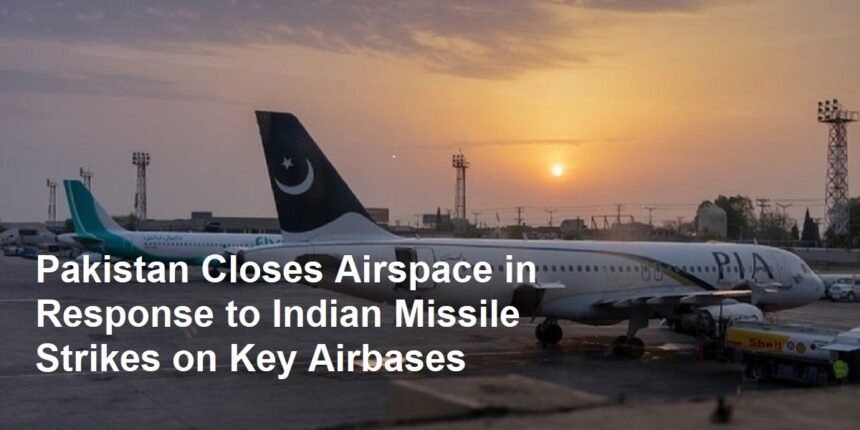On Saturday, May 10, 2025, Pakistan took the significant step of closing its entire airspace following a series of missile strikes launched by the Indian military targeting three key Pakistani airbases. This unprecedented move marks a serious escalation in the already tense and volatile relations between the two neighboring countries, which have a long history of conflict and rivalry, particularly over the disputed Kashmir region.
Background and Context
India and Pakistan have shared a fraught relationship since their independence in 1947, marked by multiple wars, border skirmishes, and ongoing political tensions. Both countries maintain substantial military forces along their borders, and the region has witnessed frequent flare-ups that threaten regional stability. The recent missile attacks by India on Pakistani airbases represent one of the most aggressive military actions in recent years, prompting Pakistan to respond decisively by shutting down its airspace to all civilian and military flights.
Details of the Missile Strikes
According to official statements from the Pakistani military, the Indian armed forces launched precision missile strikes targeting three major airbases within Pakistan’s territory. These airbases are critical to Pakistan’s air defense and military operations, serving as hubs for fighter jets, surveillance aircraft, and logistical support. The strikes reportedly caused damage to infrastructure and military assets, although Pakistan has not disclosed the full extent of the impact or any casualties.
The missile attacks are believed to be part of a broader Indian military operation aimed at weakening Pakistan’s aerial capabilities and sending a strong message of deterrence. The use of advanced missile technology underscores the increasing sophistication of military engagements between the two countries.
Pakistan’s Response: Airspace Closure
In response to the missile strikes, Pakistan’s Civil Aviation Authority announced the immediate closure of the country’s airspace starting from May 10, 2025. This closure affects all commercial and private flights, both domestic and international, effectively grounding air traffic over Pakistan until further notice. The decision was made to ensure the safety of civilian aircraft and to prevent any potential escalation or accidental engagements in the airspace amid heightened military tensions.
The closure has significant implications for international air travel, as Pakistan’s airspace is a key corridor for flights between Europe, the Middle East, and South Asia. Airlines have been forced to reroute flights, leading to longer travel times and increased operational costs. Passengers traveling to or from Pakistan are facing cancellations and delays, while neighboring countries are coordinating to manage the increased air traffic on alternative routes.
Political and Military Implications
The missile strikes and subsequent airspace closure represent a serious escalation in the India-Pakistan conflict, raising concerns about the potential for a broader military confrontation. Both countries possess nuclear weapons, and any escalation carries the risk of catastrophic consequences for regional and global security.
Pakistan’s government has condemned the Indian missile attacks as a violation of its sovereignty and a dangerous provocation. Pakistani officials have vowed to respond firmly to protect national security and have called on the international community to intervene to prevent further escalation. Meanwhile, India has justified its actions as necessary measures in response to perceived threats and cross-border provocations.
International Reactions
The international community has expressed deep concern over the escalating tensions between India and Pakistan. Key global powers and regional organizations have urged both sides to exercise restraint, engage in dialogue, and avoid actions that could lead to open conflict. The United Nations and several countries have called for immediate de-escalation and the resumption of diplomatic efforts to address the underlying issues fueling the conflict.
Airlines and aviation authorities worldwide are closely monitoring the situation, adjusting flight paths and issuing travel advisories to ensure passenger safety. The disruption to air travel has also highlighted the broader economic and humanitarian consequences of military escalations in the region.
Impact on Civilians and Regional Stability
The closure of Pakistan’s airspace and the missile strikes have heightened anxiety among civilians in both countries, particularly in border areas prone to conflict. The risk of further military actions and the potential for miscalculations have led to increased security measures and emergency preparedness.
Economically, the disruption to air travel and trade routes adds pressure to already fragile economies in South Asia. The conflict threatens to undermine regional cooperation and development initiatives, with long-term consequences for peace and prosperity.
Looking Ahead
The situation remains fluid, with both India and Pakistan maintaining high military alertness. Diplomatic channels are reportedly active behind the scenes, with efforts underway to prevent further escalation and to seek a peaceful resolution. However, the deep-rooted mistrust and historical grievances between the two nations pose significant challenges to achieving lasting peace.
The closure of Pakistan’s airspace following India’s missile strikes on key military installations underscores the fragile security environment in South Asia. It serves as a stark reminder of the urgent need for dialogue, confidence-building measures, and conflict resolution mechanisms to prevent future crises.
Conclusion
The missile attacks by India on Pakistani airbases and Pakistan’s subsequent closure of its airspace on May 10, 2025, represent a critical juncture in the longstanding conflict between the two countries. The escalation has immediate implications for military strategy, civilian safety, international travel, and regional stability. As the world watches closely, the hope remains that both nations will choose diplomacy over confrontation to secure a peaceful future for their peoples and the broader region.









